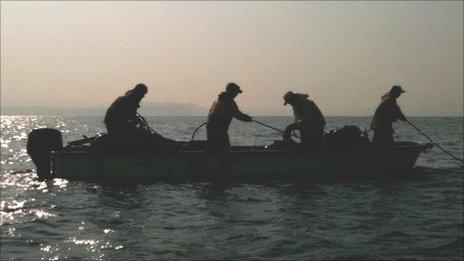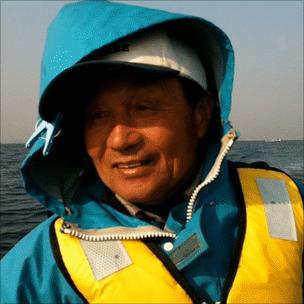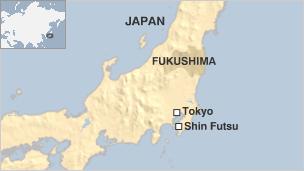Fukushima disaster: Japan fishermen brace for the worst
- Published

Shin Futsu fishermen fear that some of the radioactive elements will eventually wash up at the port
The small port of Shin Futsu sits on the edge of Tokyo Bay, about a two hour drive from the capital.
It is about 200km (124 miles) down the coast from the Fukushima nuclear plant where extraordinarily high levels of radiation have been detected in the sea near the reactors.
In a small boat, Kazuhiro Ogawa passes the end of the sea wall that stretches protectively around the harbour, and heads out towards his seaweed farm.
It is cold and bright - the sun has not been up for an hour yet.
Mr Ogawa is trying to salvage the nets and lines he grows his seaweed on. They were wrecked by the tsunami, the metal anchor posts all bent out of shape.
An oil spill, blamed on the disaster, compounded the problem.
Fear of radiation
But it is the difficulties they are having at the nuclear plant that really worries him.

Kazuhiro Ogawa is worried that his customers may abandon him
"We'll be in trouble if the radiation comes here," Mr Ogawa says.
"We don't just work at sea, we farm rice and vegetables too. I'm just about to plant my rice, I don't want radiation on it."
Both radioactive iodine and caesium have been detected off the eastern coast of Japan.
Iodine is less of a problem because it starts to dissipate over a few days, but the risk posed by caesium will last far longer. It won't decay to any great extent for decades.
The prefecture of Chiba where Shin Futsu sits may get some protection from ocean currents which might spread the contamination away from the coastline out to sea.
But there are concerns at the port that some of the radioactive elements will eventually wash up there.
It could be absorbed by the seaweed or the fish.

The amounts would probably be too small to pose a risk to human health. But it's likely they would be large enough to worry consumers whose business, of course, the fishermen of Shin Futsu depend on.
The Shin Futsu fisherman's co-operative is worried that fear of radiation could yet turn out to be a bigger issue than the radiation itself.
"What I'm really worried about, even more than the radiation issue, is public opinion," their spokesman Yoshiaki Ito says.
"If there is any hint that food products in this area could be contaminated, then that would have a greater effect than the actual radiation itself.
The fishing industry is hugely important here: Japan consumes about 9m metric tones of seafood every year.
'No fear'
Yasuyo Katoh's wrapped in a bonnet to protect her from the sun.
She's trying to untangle some of the nets that were ruined by the tsunami.
She's sitting on the slipway near the quay working with a group of other local women.
She says she is eating only the fish she put in the freezer before the radiation started leaking.
"I don't know what I will do it when that runs out," she explains.
"I'm also worried about the water, and the vegetables. I'm worried about everything. I just wish things would get back to normal."
Further down the quay some children have stripped down to their underwear and are leaping off the breakwater into the water.
They have no fear of the height of the drop or of the water beneath.
In most coastal areas further away from the nuclear plant you will find people who don't feel they are at risk - they don't see why their lives should be affected.
But you will also find plenty of others who are uneasy about the prospects for the weeks ahead and uncertain about the dangers or at least the problems they're currently facing.